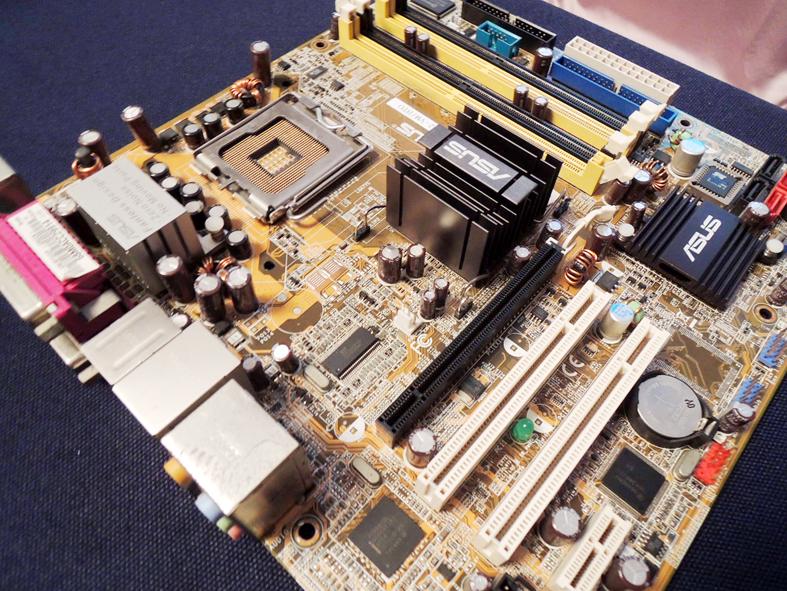Local printed circuit board (PCB) makers are planning alternative water sources — such as using recycled water, preparing water storage facilities or hiring water trucks to transport water from remote areas — in anticipation of more stringent water rationing as the nation’s most severe water shortage in 56 years worsens.
PCB production in Taiwan is somewhat clustered in the Taoyuan region, where the water shortage alert was on Friday raised from “yellow” to “orange,” resulting in reduced water supplies for households and industrial users.
“PCB suppliers’ backup water storage can provide three days of water supply. In other words, four straight days of water outages would cause production disruptions,” Yuanta Securities Investment Consulting Co (元大投顧) analysts said in a note on Friday.

Photo: Tsai Ching-hua, Taipei Times
The analysts said the water shortage is affecting PCB makers’ production in the second quarter, while the outlook for the third quarter remains uncertain.
The manufacturers include Nan Ya Printed Circuit Board Corp (南亞電路板), Unimicron Technology Corp (欣興電子), Kinsus Interconnect Technology Corp (景碩科技), Chin-Poon Industrial Co (敬鵬工業), Allied Circuit Co (博智電子), Flexium Interconnect Inc (台郡科技) and Taiflex Scientific Co (台虹科技).
On Friday night, there were heavy rains, but the catchment area at the Shihmen Reservoir (石門水庫) in Taoyuan received only 6.4mm of rain and the reservoir — which supplies water to Taoyuan and the western part of New Taipei City — was at a mere 9.81 percent of capacity as of noon on Saturday, Water Resources Agency data showed.
The agency said that the water shortage alert in Taoyuan would remain “orange,” but Taoyuan Mayor Cheng Wen-tsan (鄭文燦) has said that the alert would change from “orange” to “red” at the end of this month or early next month if there is not a large amount of rain.
Even though New Taipei City’s Feitsui Reservoir (翡翠水庫) could still support water demand in Taoyuan and Hsinchu until July, Yuanta said that it would reassess its intake and decide whether to continue supplying water if there is a less than ideal amount of rain during the plum rain season.
“Industrial water supply costs NT$12 per tonne, while water delivered by water tank costs NT$400 per tonne. Based on our estimates, water accounts for 0.2 percent of PCB suppliers’ production costs,” Yuanta analysts said. “If water shortages become more serious, Taiwan-based PCB plants will need to deliver water using water tanks, increasing production costs.”
PCB makers would also need to watch for changes in foreign-exchange rates and raw material prices regarding their earnings outlook, the analysts said.
The appreciation of Asian currencies and raw material price hikes stemming from the US Federal Reserve’s quantitative easing have put pressure on the PCB sector’s earnings since the second half of last year, and major manufacturers have raised average selling prices from last month to reflect part of the cost increases, the analysts said.
“Persistent raw material price hikes are likely to continue to suppress PCB makers’ earnings in the second quarter of this year,” they said.
However, given higher consumer prices and improving employment in the US, the Fed might begin to consider gradually restricting capital injections and assess potential interest hikes in the second half of this year, they said.
“PCB players’ cost pressure will likely ease if Asian currencies depreciate against the US dollar and raw material prices also fall amid rising interest rates,” they added.

To many, Tatu City on the outskirts of Nairobi looks like a success. The first city entirely built by a private company to be operational in east Africa, with about 25,000 people living and working there, it accounts for about two-thirds of all foreign investment in Kenya. Its low-tax status has attracted more than 100 businesses including Heineken, coffee brand Dormans, and the biggest call-center and cold-chain transport firms in the region. However, to some local politicians, Tatu City has looked more like a target for extortion. A parade of governors have demanded land worth millions of dollars in exchange

An Indonesian animated movie is smashing regional box office records and could be set for wider success as it prepares to open beyond the Southeast Asian archipelago’s silver screens. Jumbo — a film based on the adventures of main character, Don, a large orphaned Indonesian boy facing bullying at school — last month became the highest-grossing Southeast Asian animated film, raking in more than US$8 million. Released at the end of March to coincide with the Eid holidays after the Islamic fasting month of Ramadan, the movie has hit 8 million ticket sales, the third-highest in Indonesian cinema history, Film

Taiwan Semiconductor Manufacturing Co’s (TSMC, 台積電) revenue jumped 48 percent last month, underscoring how electronics firms scrambled to acquire essential components before global tariffs took effect. The main chipmaker for Apple Inc and Nvidia Corp reported monthly sales of NT$349.6 billion (US$11.6 billion). That compares with the average analysts’ estimate for a 38 percent rise in second-quarter revenue. US President Donald Trump’s trade war is prompting economists to retool GDP forecasts worldwide, casting doubt over the outlook for everything from iPhone demand to computing and datacenter construction. However, TSMC — a barometer for global tech spending given its central role in the

Alchip Technologies Ltd (世芯), an application-specific integrated circuit (ASIC) designer specializing in server chips, expects revenue to decline this year due to sagging demand for 5-nanometer artificial intelligence (AI) chips from a North America-based major customer, a company executive said yesterday. That would be the first contraction in revenue for Alchip as it has been enjoying strong revenue growth over the past few years, benefiting from cloud-service providers’ moves to reduce dependence on Nvidia Corp’s expensive AI chips by building their own AI accelerator by outsourcing chip design. The 5-nanometer chip was supposed to be a new growth engine as the lifecycle